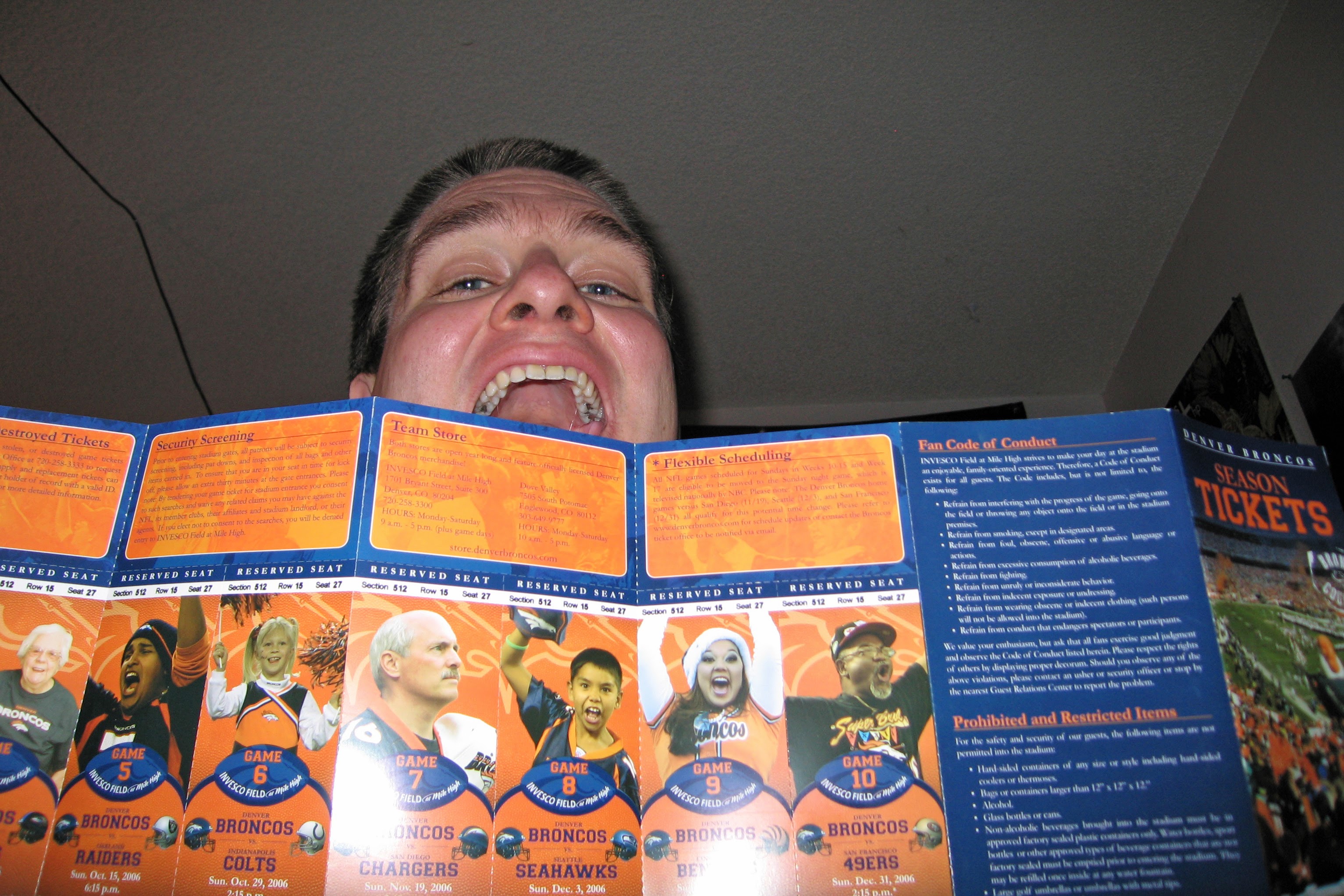Broncos embrace mobile ticketing for 2018 season
In which by “embrace mobile ticketing”, they mean they’re taking away the ability for season ticket holders to print tickets from home, requiring you to use their ticketing system to broker not only re-selling the tickets but any transfers as well. I always love the PR spin that acts like they’re giving you something when they take something away.
One one hand, I can understand their justification for doing this, and the selling point that this will cut down on high-margin scalping and counterfeit tickets, which is all well and good, but when I heard about this policy change, I couldn’t stop thinking about two formative stories that shape my view of mobile ticketing.
- Back in the fall of 2017, I purchased tickets to Mumford and Sons, only available as a moble ticket. It turned out that I had to travel for work the week of the show, and tried to transfer 2 of the four tickets to my wife and the other two my friend. The ticketing system was so shoddy that it ended up taking days of attempts before I believed the transfers went through. Fast forward to the night of the concert, when I got a call from both of them stating that the tickets I transferred to my friends weren’t coming up. So there everyone was, in line and stressed out about not being able to get in, while I was far away and essentially powerless to help them out. The concert attendants weren’t particularly helpful, and who can blame them when they have a compounding line of people eager to get in. We finally solved the whole problem by me re-claiming the transferred tickets, screen shooting them from my phone and texting the image over to my friend – which I should have just done, to begin with.
- This time the last year, the Broncos went on a massive audit of season ticket holders, establishing a newly-formed policy that they would revoke tickets to people who didn’t go to any games that year. They used the only data point that was convenient at the time – the NFL Ticket Exchange and tracking the electronic tickets. I detailed my concerns about this last year, but the bottom line was that for all practical purposes, my tickets should have been revoked and the only thing that saved me was the wherewithal of “selling” (and by selling, it was at-cost to friends and family) the tickets through the printed tickets.
Make no mistake, this is about making sure the Broncos and the NFL have the data points for all ticket transactions and can harvest the data for their own purposes, especially for retroactively enforcing policies that they just made up. I wouldn’t be surprised after next season they’ll take tickets away from someone who wasn’t able to go, transferring the tickets to friends and family. And yes, I understand that there are fans that abuse their tickets by massively upselling them and not attending any games for years at a time. It would be fair to call their fandom into question. However, there are also many other fans that simply may have had a life event (like a birth, a sickness, a temporary job relocation) disrupt a single year of their attendance, and despite devoutly attending games for a decade before, they’re subject to the same revocation. The Broncos have every right to do that, but it doesn’t make it a complete jerk move and fan-hostile.
Mobile ticketing ENABLES season ticket audits. I’m all for preventing scalping, but if you were serious about punishing scalpers you could send an intern out on game day, pretend to consider a scalper’s ticket and note the seat #, call the ticket holder the next day. Sure it takes a little more work, but it punishes those who are egregiously violating your policies, rather than the low-hanging fruit of new parents that sold the tickets to their next-door neighbors.
If you go read the article and the FAQ, they’ll tout that 35% of their fans used mobile ticketing last year, conveniently forgetting that 2/3 of their other fans have never used this process. I’d get it if 80-90% of the fanbase were using their phones to get into games, but don’t pretend they’re not trying to ram something down fans throats that they didn’t even ask for. Don’t piss on my leg and then tell me that you’re making me fire-retardant.
What about for friends who buy my tickets or if I can’t go? Now they’re all going to need TicketExchange accounts and I will basically need to handhold their app experience. Where’s the convenience in that? Now the Broncos are making their season ticket holders your front-line support for your app. I imagine that many more fans are going to have a similar experience to my Mumford and Sons story from above. Emailing tickets to my friends wasn’t a problem that needed solving.
I went back & forth on Twitter with one of their PR reps (and to their credit, they were at least responding – unlike last year), and he was quick to justify that other teams were doing this and that the NFL is moving over to this. However, the Avalanche, Nuggets, and Rockies are still providing paper tickets with nice commemorative designs. Even if many more teams were using this system, just because others (don’t) do it, doesn’t make it right. This is a race to the bottom for the fan experience. Commemorative tix aren’t the issue – introducing a barrier (preventing printing) to my “honest fan” experience, all to collect data to possibly punish me later on – is.
This isn’t about being a luddite or not embracing technology, this is about protecting yourself from data harvesting that is only going to be used to punish you, as the Broncos and NFL continue to squeeze blood out of turnips for their money-printing machines.
